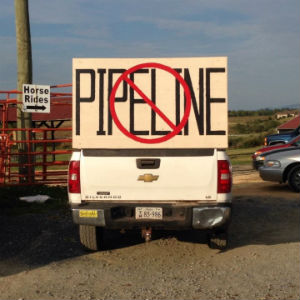
Dominion is seeking to build a 1,558-megawatt power plant in Greensville County, Virginia. If built, it would be the largest gas plant in the state. The plant would burn fracked natural gas supplied directly by another Dominion project — the Atlantic Coast Pipeline — a nearly 600-mile long pipeline that would be larger in diameter than the Keystone XL.
The conservation groups point out that the direct connection between the power plant and the pipeline poses a significant problem for Dominion. Typically, even the largest pipeline doesn’t need a “major new source” air permit because its emissions are primarily methane, a powerful greenhouse gas. But under the Clean Air Act, greenhouse gas pollution alone is not enough to trigger the need for a permit.
“Here, you have the unusual situation where the same corporation is pushing both the pipeline to supply the gas and the power plant to burn it. They’re meant to come online at the same time and function together. But Dominion looked at pollution from only the power plant, not the pipeline,” said Evan Johns, staff attorney with Appalachian Mountain Advocates. The Greensville plant would emit carbon monoxide, nitrogen oxides and other pollution that is harmful to human health, triggering the Clean Air Act’s permit requirement.
The groups claim neither the pipeline nor the power plant can go forward until Dominion does a full analysis of all expected air pollution and reduces that pollution to comply with the law.
“Federal law requires Dominion to use the best technologies to control emissions, which clearly points to incorporating solar energy at this plant. There are no smokestacks at a solar farm, not to mention that solar energy is more affordable for ratepayers,” said Kate Rooth, Campaign Director for Appalachian Voices.
Even then, the groups argue the power plant is a bad deal for Virginians. “Dominion wants to raise our electricity rates and increase carbon pollution for a power plant we don’t need,” said Glen Besa, Director of the Virginia Chapter of the Sierra Club. The $1.3 billion Greensville plant would be just miles from the Brunswick Power Station, a 1,358-megawatt gas plant expected to go online next month.
“We’d be committed to buy Dominion’s gas for decades, intensifying the pressure to frack and to build pipelines, pushing off investment in clean energy options. Even Dominion acknowledges that clean, renewable energy sources can often be just as affordable,” said Johns.
The groups also claim the power plant should have been evaluated as a major source of hazardous air pollutants because of its potential to emit high levels of formaldehyde, a known carcinogen.
Earlier this week, the State Corporation Commission approved the Certificate of Public Convenience and Necessity for the Greensville power plant. The groups have asked for a hearing before the State Air Pollution Control Board, which has purview over the air permits which are necessary before construction.
Appalachian Mountain Advocates is representing the Virginia Chapter of the Sierra Club and Appalachian Voices in this action.










